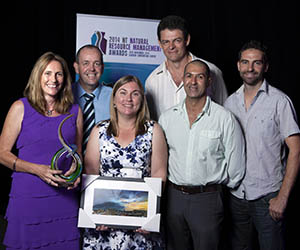10 December 2014

Weed researchers (from left): Associate Professor Samantha Setterfield, Professor Michael Douglas, Dr Natalie Rossiter-Rachor, Professor Lindsay Hutley, Dr Keith Ferdinands, and Damien McMaster
A hub research team investigating invasive weeds were awarded the ‘Best Research in NRM’ at the 2014 Territory NRM Awards dinner at the Darwin Convention Centre in November. The award recognises the success that the team has had in extending our understanding of weeds in the Northern Territory and significantly influencing weeds policy and management.
The research has given land managers a better understanding of the ecology, distribution and impact of weeds, particularly invasive grasses, on a range of ecological services including fire regimes, carbon and nutrient cycling.
This has underpinned the development of a weed risk management system, which is now used by the NT Government in their decision-making and prioritisation of weed management activities to control invasions and prevent further spread. As a result of the research, several high risk exotic species were declared as weeds.
Associate Professor Sam Setterfield, who has been leading the research for over 15 years, says the team were honoured to have their research contribution to weed management recognised by Territory NRM.
“This is the outcome of a long collaboration with a number of agencies, including the NT Government’s Weeds Branch and Bushfires NT,” she said.
The team is at the forefront of research into invasive high biomass grasses, like Gamba grass. High biomass grasses are much taller and denser than native savanna grasses and create very high fuel loads. One of the findings of the research has been a clear pattern of more intense fires and declining biodiversity in areas where high biomass grasses establish and spread.
Want to know more about the Resilient Landscapes Hub's activities and our research into practical solutions to environmental problems? Stay informed about activities, research, publications, events and more through the Hub newsletter.